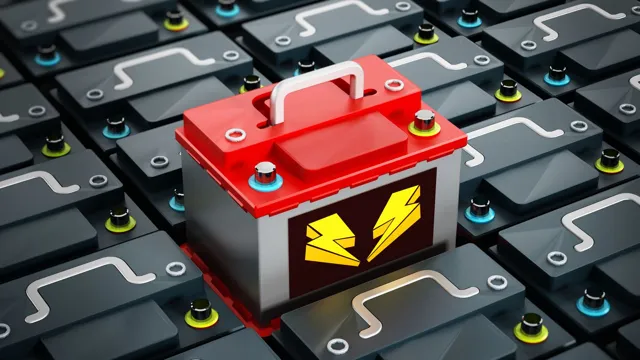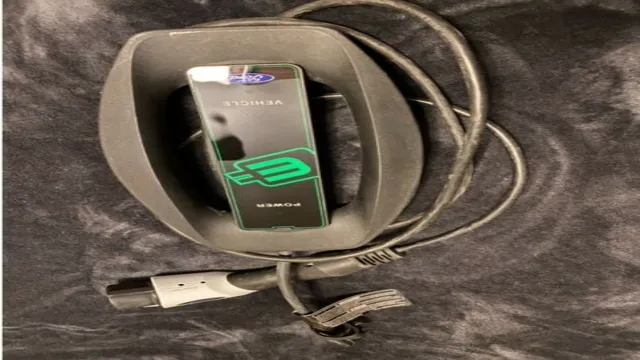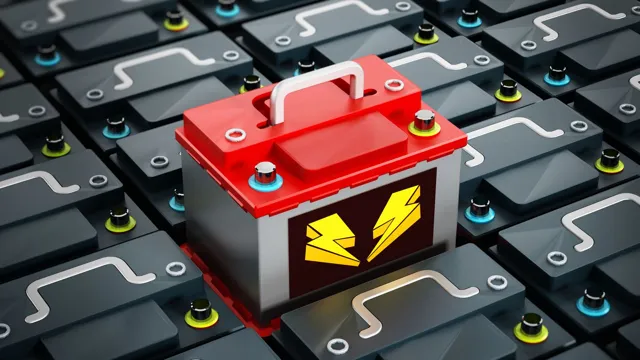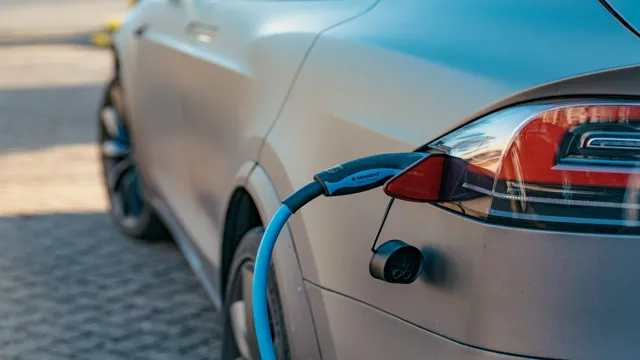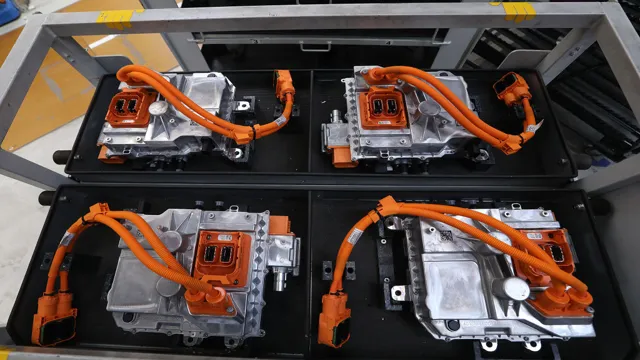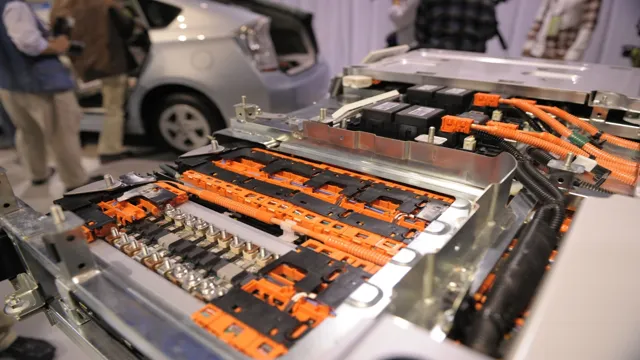Revolutionary Glass Battery: Powering the Future of Electric Cars
Do you know what the future of electric cars looks like? It just got a whole lot brighter. Researchers have been working tirelessly to revolutionize the electric vehicle industry and finally, they have made a breakthrough. The key to this game-changing technology is a battery made entirely of glass.
While traditional lithium-ion batteries have been the standard for electric vehicles for quite some time, they come with a notable set of drawbacks like overheating and an unpredictable lifespan. Glass batteries, on the other hand, have the potential to be lightweight, more efficient, and far safer. Imagine the possibilities of your electric car going more miles and holding more charge, all while being powered by a safer battery.
These glass batteries have the potential to not only help advance the electric vehicle industry but also benefit the wider clean energy movement. The hope is that this breakthrough paves the way for a future with lower carbon emissions and a more sustainable way of living. With the introduction of glass batteries, electric cars may finally become a more practical and affordable option.
The technology is still in its infancy, but the potential perks are truly exciting. It’s an amazing time to be alive, witnessing innovation after innovation. With the potential of glass batteries, we may soon make even more headway towards a cleaner, better future.
The Future of EV Batteries
The future of electric car batteries looks bright, thanks to a promising new technology called the “glass battery”. This innovative battery uses a solid-state electrolyte, which replaces the liquid electrolyte found in traditional lithium-ion batteries. This not only makes the battery safer and more stable, but it also allows for higher energy density and faster charging times.
In fact, this technology could potentially double the range of current electric cars, making them more practical for longer trips. Additionally, glass batteries have a longer lifespan than lithium-ion batteries, reducing the need for frequent replacements. With all of these benefits, it’s no wonder that many in the industry are excited about the potential of glass batteries for the future of electric cars.
Benefits of Glass Batteries
Glass batteries are the future of EV batteries as they offer multiple benefits over traditional batteries. One of the biggest advantages is their longer lifespan. These batteries are expected to last up to three times longer than the current lithium-ion batteries used in most EVs.
This means less frequent replacements and lower costs in the long run. Additionally, glass batteries are made using more sustainable materials such as sodium and glass, which are abundant and inexpensive. They also do not pose as much of a risk for fire or explosion as lithium-ion batteries.
With the growing demand for EVs, glass batteries could play a critical role in creating a more sustainable and safe electric transportation system.

Longer Lifespan
The future of EV batteries is looking bright, with longer lifespan being one of the top priorities for battery manufacturers. As the demand for electric vehicles continues to rise, so does the need for more efficient and longer-lasting batteries. Thanks to advances in technology, battery lifespan has been steadily increasing over the years.
In fact, some manufacturers are now advertising that their batteries last for 1 million miles! This is a huge step forward from just a few years ago when batteries were only expected to last 100,000 miles. The key to this longer lifespan is the use of high-quality materials and advanced designs that are better able to handle the stresses of daily use. With these improvements, the future of EV batteries looks bright, and electric cars will become even more practical and affordable.
Faster Charging
As electric vehicles continue to gain in popularity, one aspect that has remained a concern for drivers is the speed of charging. However, the future of EV batteries promises faster charging times and greater convenience for drivers. Many manufacturers are investing heavily in research and development to improve battery technology, which includes the use of higher energy density materials and improved cooling systems.
These advancements will result in batteries that can charge faster and provide longer ranges, giving drivers even more reasons to switch to electric vehicles. With faster charging options, drivers will no longer have to worry about waiting extended periods of time to get back on the road, making owning an electric vehicle more practical than ever.
How Glass Batteries Work
When it comes to electric car batteries, most people think of the traditional lithium-ion batteries. However, there’s a new type of battery that is slowly gaining attention – the glass battery. Glass batteries are made from a special type of glass that contains sodium ions instead of lithium ions.
These batteries are not only safer and longer-lasting than traditional batteries, but they’re also much more environmentally-friendly. The glass battery has the potential to revolutionize the electric car industry, as it could allow for longer drives and shorter charging times. Plus, since it’s made from readily-available materials, it can be produced at a much lower cost than traditional lithium-ion batteries.
It’s exciting to see this new technology emerging, and it will be interesting to see how it will impact the future of electric cars.
Sodium and Glass Electrolyte
Glass batteries have been a hot topic in the energy industry recently, and it’s no mystery why. These batteries have the potential to store more energy than traditional lithium-ion batteries and last longer too. They’re made with a special type of glass electrolyte that has sodium ions in it instead of lithium ions.
When the battery is charged, the sodium ions move from one side of the battery to the other, creating energy. What’s really exciting about these batteries is that they could be much cheaper to produce since they use abundant elements like sodium and glass. Plus, they may be safer since they don’t contain the flammable liquids found in lithium-ion batteries.
With their potential to revolutionize the energy industry, it’s no wonder so many people are excited about the possibilities of glass batteries.
Solid-State Technology
Solid-state technology has been making huge strides in the world of batteries, and one of the most intriguing developments is the creation of glass batteries. Unlike traditional lithium-ion batteries, which rely on liquid electrolytes to transfer energy, glass batteries utilize solid electrolytes made of ceramics. This makes them incredibly durable and resistant to leaking or catching fire.
But perhaps the most exciting aspect of glass batteries is their potential for higher energy density. Essentially, this means they can store more energy in a smaller space, leading to longer-lasting and more powerful devices. It’s still early days for glass batteries, but researchers are hopeful about their future applications in everything from electric cars to portable electronics.
Chemical Stability
Glass batteries are a new type of battery that are gaining popularity due to their chemical stability and ability to last longer than traditional lithium-ion batteries. These batteries are made by using glass electrolytes instead of liquid electrolytes, which makes them safer and more efficient. The beauty of glass batteries lies in their chemical stability, which means they are resistant to corrosion and degradation over time.
This is because glass is a non-reactive material that doesn’t degrade or break down easily. With their superior performance, glass batteries have the potential to revolutionize the battery industry, making it safer, more efficient, and more environmentally friendly.
Glass Battery Applications
One of the most exciting breakthroughs in battery technology is the development of the electric car glass battery. This new type of battery uses glass as a key material instead of the traditional lithium-ion batteries commonly used in electric cars. Glass batteries can charge much faster, last longer, and are more durable than traditional batteries.
In addition to powering electric cars, glass batteries have the potential to affect a wide range of industries and applications, including smartphones, laptops, and even aerospace technology. With the ability to revolutionize the way we store and use energy, the electric car glass battery is a game-changer that holds great promise for the future.
EVs and Energy Storage
Glass Battery Applications Electric vehicle (EV) technology is rapidly evolving and the energy storage industry is an integral part of it. Glass batteries have been gaining popularity over traditional lithium-ion batteries due to their increased energy density and faster charging capability. These batteries use sodium instead of lithium, which eliminates the risk of overheating and battery fires.
The glass electrolyte also prevents the formation of dendrites, which reduces the chances of short circuits and battery failure. Glass batteries have the potential to revolutionize the EV industry, making EVs more reliable and efficient. They also have the potential to be used in other applications, such as smartphones and laptops.
The possibilities are endless with this new technology and it will be exciting to see what the future holds for glass battery applications.
Mobile Devices and Wearables
Mobile devices and wearables have revolutionized the way we interact with technology on a daily basis, but their battery life is still a limiting factor for many users. That’s where the glass battery comes in. Developed by a team of scientists at the University of Calgary, this innovative battery technology promises to significantly boost the battery life of mobile devices and wearables, while being much safer and more environmentally friendly than current battery technologies.
The glass battery utilizes a solid-state electrolyte, which eliminates the risk of flammability and leakage that are common with traditional liquid electrolytes. This makes the glass battery not only safer to use, but also easier to manufacture and recycle. With its potential to be integrated into a range of mobile devices and wearables, including smartphones, smartwatches, and fitness trackers, the glass battery could be the game-changer that users have been waiting for.
Conclusion
In conclusion, the electric car glass battery is not just a revolutionary innovation in automobile technology, but also a shining example of the power of interdisciplinary collaboration. With the combination of chemistry and material science, engineers were able to create a sustainable and durable energy storage solution that is integrated seamlessly into the vehicle. Plus, who wouldn’t want a car with a transparent battery that looks like it came straight out of a science fiction movie? The future is bright, and in more ways than one, thanks to the electric car glass battery.
“
FAQs
How does the glass in electric car windows differ from traditional car windows?
Electric car windows are often made with special coatings that reduce heat transfer and increase energy efficiency.
How do electric car batteries compare to traditional car batteries in terms of lifespan?
Electric car batteries can last up to 10 years or more, while traditional car batteries typically need replacement every 3 to 5 years.
What are some common materials used in electric car battery production?
Lithium-ion batteries are the most commonly used batteries in electric cars, but other materials like nickel-metal hydride and solid-state batteries are also being developed.
How does the efficiency of an electric car battery affect the vehicle’s range?
The more efficient an electric car battery is, the longer the vehicle can travel on a single charge, which is known as the vehicle’s range. Improving battery efficiency is a key focus of electric car research and development.
